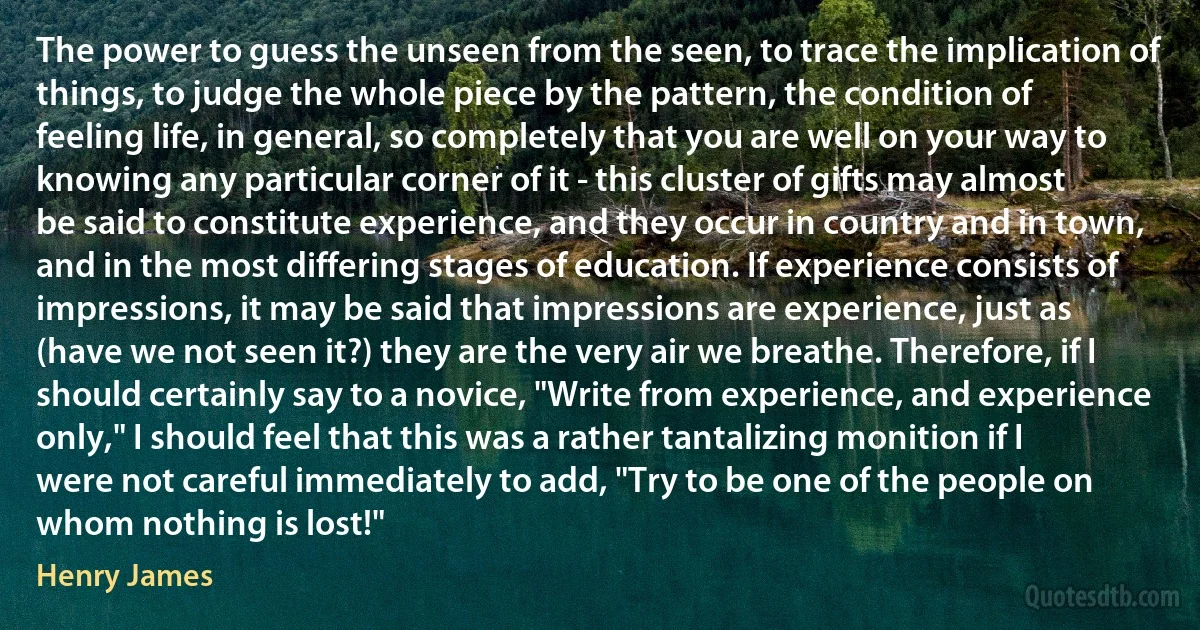
The power to guess the unseen from the seen, to trace the implication of things, to judge the whole piece by the pattern, the condition of feeling life, in general, so completely that you are well on your way to knowing any particular corner of it - this cluster of gifts may almost be said to constitute experience, and they occur in country and in town, and in the most differing stages of education. If experience consists of impressions, it may be said that impressions are experience, just as (have we not seen it?) they are the very air we breathe. Therefore, if I should certainly say to a novice, "Write from experience, and experience only," I should feel that this was a rather tantalizing monition if I were not careful immediately to add, "Try to be one of the people on whom nothing is lost!"
Henry JamesRelated topics
add air almost condition corner country education experience general implication judge knowing life lost nothing people piece power say seen should tantalizing town try way well write thingsRelated quotes
I gave up on this stuff. I gave up on my species and ... I gave up on my countrymen. Because I think we squandered great gifts. I think humans were given great great gifts: walking upright, binocular vision, opposable thumb, large brain ... We grew. We had great gifts, and we gave it all up for both money and God ... We gave it all up to superstition, primitive superstition, primitive shit ... Invisible man in the sky, looking down, keeping track of what we do, make sure we don't do the wrong thing, if we do, he puts us in hell, where we burn forever. That kind of shit is very limiting for this brain we have. So we keep ourselves limited. And then we want a toy and a gizmo and gold and we want shiny things, and we want something to plug in that will make big big big things for us... And all that shit is nothing! It's nothing.

George Carlin
If Christ were to walk in this world today, do you know what would happen to Him? He would be placed in a mental institution and given psycho-therapy, just as would His Saints. The world would crucify Him today just as it did 2000 years ago, for the world has not learned a thing, except more devious forms of hypocrisy. And what would happen if, in one of my classes at the university, I would one day tell my students that all the learning of this world is of no importance beside the duty of worshipping God, accepting the God-man who died for our sins, and preparing for the life of the world to come? They would probably laugh at me, and the university officials, if they found out, would fire me-for it is against the law to preach the Truth in our universities. We say that we live in a Christian society, but we do not: we live in a society.

Seraphim Rose
I have watched how steadily the general feeling, as shown at elections, has been rising against Slavery. What a proud thing for England if she is the first European nation which utterly abolishes it! I was told before leaving England that after living in slave countries all my opinions would be altered; the only alteration I am aware of is forming a much higher estimate of the negro character. It is impossible to see a negro and not feel kindly towards him; such cheerful, open, honest expressions and such fine muscular bodies. I never saw any of the diminutive Portuguese, with their murderous countenances, without almost wishing for Brazil to follow the example of Hayti; and, considering the enormous healthy-looking black population, it will be wonderful if, at some future day, it does not take place.

Charles Darwin
There are particular movements in particular epochs in which the Divine Force manifests itself with supreme power shattering all human calculations, making a mock of the prudence of the careful statesman and the scheming politician, falsifying the prognostications of the scientific analyser and advancing with a vehemence and velocity which is obviously the manifestation of a higher than human force. The intellectual man afterwards tries to trace the reasons for the movement and lay bare the forces that made it possible, but at the time he is utterly at fault, his wisdom is falsified at every step and his science serves him not. These are the times when we say God is in the movement, He is its leader and it must fulfil itself however impossible it may be for man to see the means by which it will succeed.

Sri Aurobindo
General systems theory, in a sense, is no news at all, as Von Foerster found out when he attempted to organize a conference of general systems people and anthropologists. In a sense, the situation is comparable to that found by the Committee for the Study of Mankind, in which a committee that included Robert Redfidd tried to get each discipline to consider its relationship to the concept of Mankind. Anthropologists replied, "we are related already," and so they were. Something similar may be said of attempts to date in mathematical anthropology. The kind of information that a computer program can finally provide, on a level of a particular culture, is simply a reflection of how detailed field work has been done, and to the careful field worker, on kinship, for example, it provides no illumination.

Margaret Mead
